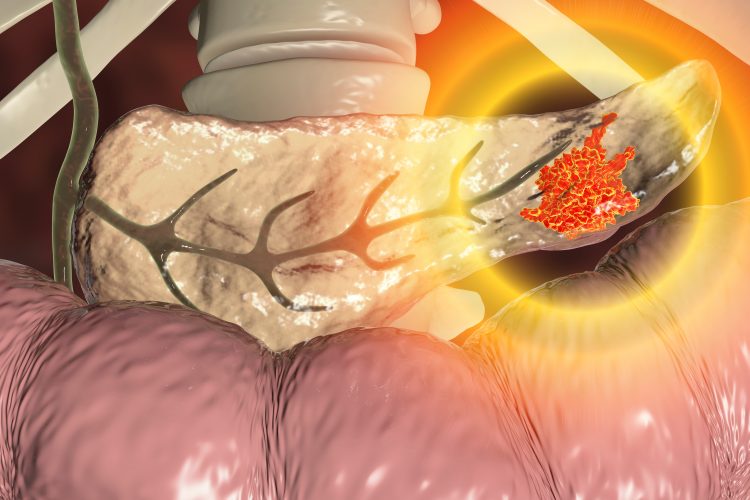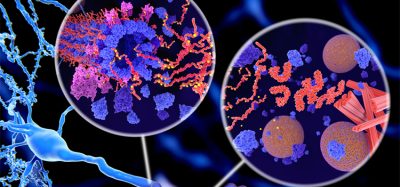Inhibiting sortilin could make pancreatic cancer therapies more effective
Posted: 21 August 2020 | Hannah Balfour (Drug Target Review) | No comments yet
A study has shown that inhibiting sortilin, a neuroprotein known to have increased expression in cancers, reduces pancreatic cancer invasiveness in vitro.


Researchers have identified that the increased expression of a neuroprotein called sortilin on the surface of pancreatic cancer cells could be a potential target for new, more effective pancreatic cancer treatments.
Pancreatic cancer is the third most common cause of cancer deaths in the US and has an extremely poor prognosis, with few patients expected to survive five years. The morbidity of the disease is due to its highly aggressive and invasive nature, as well as the lack of an effective treatment option. However, new research published in The American Journal of Pathology suggests that a neuronal membrane protein called sortilin could be targeted to slow the invasion of pancreatic cancer, offering a new treatment option.
“There is currently no good therapy for pancreatic cancer,” explained lead investigator Dr Hubert Hondermarck, School of Biomedical Sciences and Pharmacy and Hunter Medical Research Institute at the University of Newcastle, Australia. “What we need is a targeted therapy that could slow down the rapid progression of the disease to allow more time for chemotherapy and radiotherapy to be more effective.”
The neuroprotein sortilin is emerging as a key player in the regulation of neuronal viability and function. There is also evidence indicating that it is involved in the deregulation of cancer cell viability. Sortilin is overexpressed in breast, lung and thyroid cancer; it can promote cancer cell invasion in glioblastoma; and it participates in cancer cell adhesion and metastasis in colorectal cancer. However, its expression and impact in pancreatic cancer was not previously known.
In this study, investigators examined 99 human pancreatic adenocarcinoma cell lines alongside 48 pancreatic ductal epithelial cell samples and established using Western blot and mass spectrometry that sortilin expression was higher in the cancer cells.
Furthermore, the study suggested that sortilin contributes to pancreatic cancer invasion in vitro through maintaining the focal adhesion kinase (FAK) signalling pathway. Researchers also found that sortilin levels were higher in female pancreatic cancer patients compared to males. Dr Hondermarck commented: “Our finding of higher sortilin expression in female patients suggests a possible regulation of sortilin gene expression by estrogen receptors, but further functional analyses are needed to confirm this hypothesis.”
![Pancreatic cancer cells in control (A) vs treatment by anti-sortilin targeting drug (B). When sortilin is targeted, pancreatic cancer cells partially lose attachment and cannot migrate. Scale bars = 50um [credit: Hubert Hondermarck's Laboratory].](https://www.drugtargetreview.com/wp-content/uploads/Hondermarck-pancreatic-cancer-sortilin.jpg)
![Pancreatic cancer cells in control (A) vs treatment by anti-sortilin targeting drug (B). When sortilin is targeted, pancreatic cancer cells partially lose attachment and cannot migrate. Scale bars = 50um [credit: Hubert Hondermarck's Laboratory].](https://www.drugtargetreview.com/wp-content/uploads/Hondermarck-pancreatic-cancer-sortilin.jpg)
Pancreatic cancer cells in control (A) vs treatment by anti-sortilin targeting drug (B). When sortilin is targeted, pancreatic cancer cells partially lose attachment and cannot migrate. Scale bars = 50um [credit: Hubert Hondermarck’s Laboratory].
As mentioned above, the main issue for tackling pancreatic is the extent of its local invasiveness; pancreatic tumours rapidly invade and destroy the pancreas resulting in death. This study found that inhibiting sortilin with specific drugs or immunotherapy lead to a decrease in pancreatic cancer cell invasiveness. Therefore, specifically targeting sortilin is likely to complement and improve the efficacy of existing treatments. However, because no statistically significant association was found between sortilin expression and pancreatic cancer aggressiveness the team concluded that it is likely not the only factor involved in pancreatic cancer invasiveness.
“Together, these data reveal that sortilin contributes to pancreatic cancer invasion and is a potential therapeutic target,” said Dr Hondermarck. “This discovery may lead to the development of more efficient treatment against the disease.”
Current therapeutic approaches for pancreatic cancer include surgery, radiotherapy, and chemotherapy. Surgery is the most common treatment for early-stage pancreatic cancer, but it can be performed in less than 20 percent of patients. Gemcitabine, the drug typically used to treat pancreatic cancer, has only a limited therapeutic effect.
Related topics
Cell Cultures, Disease Research, Drug Targets, In Vitro, Oncology, Protein Expression, Proteomics, Therapeutics
Related conditions
Breast cancer, Lung cancer, Pancreatic cancer, Thyroid cancer
Related organisations
University of Newcastle (Australia)
Related people
Dr Hubert Hondermarck








